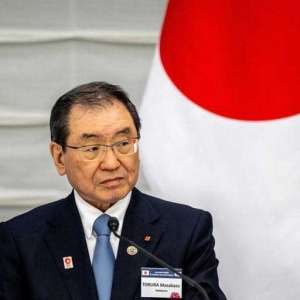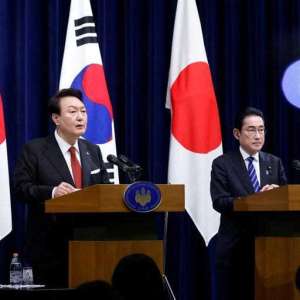Japanese and South Korean businesses seek to leave behind difficult history
Story by By Kiyoshi Takenaka and Ju-min Park • 17-3-2023
LAWSUITS
Relations between the two countries plunged to their lowest point in decades after South Korea's Supreme Court in 2018 ordered Japanese firms to pay reparations to former forced labourers. Fifteen South Koreans have won such cases, but none has been compensated.
Companies such as steelmaker Nippon Steel Corp and industrial group Mitsubishi Heavy Industries Ltd have been a target of lawsuits by former labourers.
A turning point came this month when South Korea said its own companies - several of which benefited from the 1965 treaty - would compensate forced labourers.
Yoon's support has fallen since that announcement, with his approval rating now at 33% amid public dissatisfaction over his handling of relations with Japan, a Gallup Korea poll showed on Friday.
"Japan has maintained its position that the wartime forced labour issue has been settled under a 1965 treaty," said Yuki Asaba, a professor at Doshisha University and an expert on Japan-Korea relations.
"It is likely that Japanese companies will show their sincerity by providing funds to the fund created by Japanese and Korean business groups," Asaba said. "This is the biggest goodwill gesture."
($1 = 132.9400 yen)
(Reporting by Kiyoshi Takenaka and Ju-min Park; Additional reporting by Satoshi Sugiyama and Kaori Kaneko in Tokyo and Hyunsu Yim in Seoul; Writing by David Dolan; Editing by Gerry Doyle)
Story by By Kiyoshi Takenaka and Ju-min Park • 17-3-2023
LAWSUITS
Relations between the two countries plunged to their lowest point in decades after South Korea's Supreme Court in 2018 ordered Japanese firms to pay reparations to former forced labourers. Fifteen South Koreans have won such cases, but none has been compensated.
Companies such as steelmaker Nippon Steel Corp and industrial group Mitsubishi Heavy Industries Ltd have been a target of lawsuits by former labourers.
A turning point came this month when South Korea said its own companies - several of which benefited from the 1965 treaty - would compensate forced labourers.
Yoon's support has fallen since that announcement, with his approval rating now at 33% amid public dissatisfaction over his handling of relations with Japan, a Gallup Korea poll showed on Friday.
"Japan has maintained its position that the wartime forced labour issue has been settled under a 1965 treaty," said Yuki Asaba, a professor at Doshisha University and an expert on Japan-Korea relations.
"It is likely that Japanese companies will show their sincerity by providing funds to the fund created by Japanese and Korean business groups," Asaba said. "This is the biggest goodwill gesture."
($1 = 132.9400 yen)
(Reporting by Kiyoshi Takenaka and Ju-min Park; Additional reporting by Satoshi Sugiyama and Kaori Kaneko in Tokyo and Hyunsu Yim in Seoul; Writing by David Dolan; Editing by Gerry Doyle)
3 yr. ago



